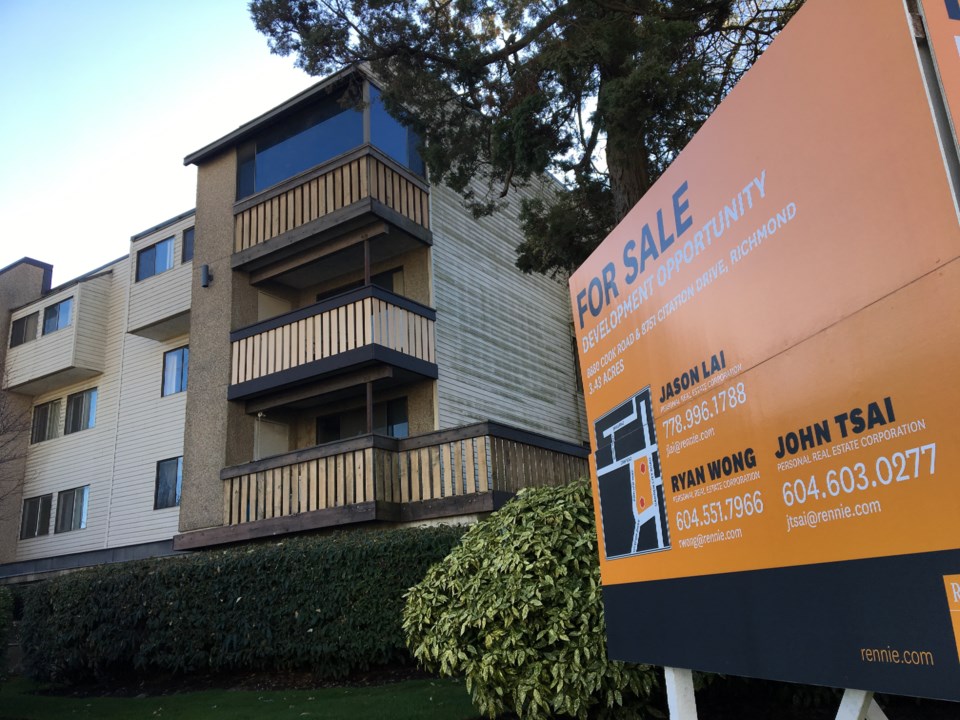Richmond’s first strata termination and sale under a recently-revised Strata Property Act has been granted by a B.C. Supreme Court judge.
Despite opposition from a minority group of owners, Mr. Justice Warren B. Milman ruled April 10 in favour of the 86 owners who agreed to sell the three-storey, 102-unit Ascott Wynde property at the corner of Cook and Garden City roads.
“I must weigh the interest of the strong majority in proceeding with the [strata termination] and sale that they voted for,” concluded Milman in a written decision, following an assessment of various complaints made by those who opposed the $49.8 million sale to Everbright Properties Inc.
The decision, required by law under the Act in order to consider any undue hardship of the minority, has Coun. Carol Day concerned for vulnerable seniors and renters facing the likes of “sharks who are currently circling other complexes in the area.”
Among the complaints heard, the difficulty residents may face in relocating was among Milman’s key considerations, including whether or not existing residents would be able to have priority access to the new, proposed 150 townhouse development that is to be built in place of the two 41-year-old buildings.
“I accept that relocating is likely to be difficult for at least some owners, for various reasons,” stated Milman.
However, Milman concluded that a 60 per cent premium sale price above the 2018 assessment value of the property was not “significantly unfair” to those who opposed the strata termination.
What could be unfair, Milman concluded, is not granting the sale, which passed under a new (2016) rule of the Strata Property Act that allows for strata terminations with a minimum 80 per cent of owners’ blessings, as opposed to 100 per cent under the old rules.
Milman noted owners face a “daunting maintenance and repair burden” of $5 million over the next 5-7 years, resulting in special levies of an estimated $36,700 to $67,700.
Some opponents, such as Victoria Grigorenko, who lives with her 87-year-old mother, argued they cannot find another place to live in Richmond. Or, if they do, it will be in a similarly old building that may have the same repair burden. It is believed by many owners that the Ascott Wynde sale has inflated listing prices in the area. Rennie and Associates agent Jason Lai said his agency is working on a number of strata sales in the city.
Milman found the compensation to be sufficient and heeded the advice of Lai that there are many older apartments in Richmond being sold for less than the listing price. Since the sale process began in 2016 units have soared in assessed value by about 50 per cent.
Nevertheless, noting strata lawyer Peter Robert’s comment that “the market has spoken,” Milman concluded “there is no sound basis for the contention that the owners are to receive inadequate compensation for their units.”
A contention from opponents, such as Gordon Bell, that the sale included a land expropriation for yet-to-be-approved road widening (and thus the price was lower than it should be) was dismissed by Milman. Rather, he agreed with Lai that it was a number of prospective purchasers who factored in the potential road widenings into their price points.
Day said that there are no plans to widen roads in the area to accommodate new developments and as such the deal may not be as good as it could have been.
Day, who attended court hearings with opponents, wants to see city policies that prohibit fast-track rezoning and/or density bonuses for properties where a strata is terminated without 100 per cent approval.



